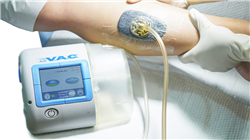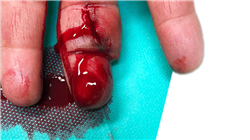University certificate
The world's largest faculty of nursing”
Introduction to the Program
Thanks to this 100% online Postgraduate certificate, you will implement the most effective prevention strategies and you will minimize the incidence of Skin Lesions in vulnerable populations”

In the context of clinical care, Dependency-Related Skin Lesions represent a constantly evolving area. This is due to advances in the field of Nursing, which has led to the discovery of new techniques for the assessment, prevention and treatment of Dependency Skin Lesions. An example of this is Negative Pressure Therapy, a technique that accelerates the healing process of Pressure Ulcers in high-risk patients. Given this reality, it is vital that nurses remain abreast of these advances to provide excellent care to their patients.
To support them in this task, TECH presents a revolutionary Postgraduate certificate in Dependency-Related Skin Lesions. The academic itinerary will delve into both the causes and risk factors of these conditions, which will allow professionals to perform early and systematic evaluations of patients. In this sense, the syllabus will delve into the most cutting-edge techniques for the cleaning of Skin Lesions, among which Debridement stands out. In addition, the program will provide graduates with useful strategies to educate patients on the importance of cleaning ulcers, changing dressings and mobilization.
The syllabus will be based on the innovative Relearning system, and will be accompanied by a variety of multimedia resources, complementary readings and detailed videos. All this from a flexible methodology, which does not follow strict schedules, so that nurses can adjust the academic update to their other professional responsibilities. On the other hand, this TECH program stands out for offering exclusive Masterclasses, given by a prestigious International Guest Director, who addresses the main innovations in the field of Dependency-Related Skin Lesions. Undoubtedly, a high-intensity experience that will allow professionals to experience a remarkable leap in quality in their careers as nurses.
Get an effective update thanks to the Masterclasses given by one of the great experts in Dependency-Related Skin Lesions”
This Postgraduate certificate in Dependency-Related Skin Lesions contains the most complete and up-to-date scientific program on the market. The most important features include:
- The development of practical cases presented by experts in Wound Care for Nursing
- The graphic, schematic and eminently practical contents with which it is conceived gather scientific and practical information on those disciplines that are indispensable for professional practice
- Practical exercises where self-assessment can be used to improve learning.
- Its special emphasis on innovative methodologies
- Theoretical lessons, questions to the expert, debate forums on controversial topics, and individual reflection assignments
- Content that is accessible from any fixed or portable device with an Internet connection
You will delve into the therapeutic procedure of Debridement, which will allow you to reduce the risk of secondary complications”
The program’s teaching staff includes professionals from the field who contribute their work experience to this educational program, as well as renowned specialists from leading societies and prestigious universities.
The multimedia content, developed with the latest educational technology, will provide the professional with situated and contextual learning, i.e., a simulated environment that will provide immersive education programmed to learn in real situations.
This program is designed around Problem-Based Learning, whereby the professional must try to solve the different professional practice situations that arise during the course. For this purpose, students will be assisted by an innovative interactive video system created by renowned and experienced experts.
Are you looking to learn more about the most beneficial foods for the healing of Pressure Ulcers? Achieve it through this program in only 180 hours"

TECH's revolutionary Relearning system in its programs reduces the long hours of study so frequent in other teaching methods"
Why study at TECH?
TECH is the world’s largest online university. With an impressive catalog of more than 14,000 university programs available in 11 languages, it is positioned as a leader in employability, with a 99% job placement rate. In addition, it relies on an enormous faculty of more than 6,000 professors of the highest international renown.

Study at the world's largest online university and guarantee your professional success. The future starts at TECH”
The world’s best online university according to FORBES
The prestigious Forbes magazine, specialized in business and finance, has highlighted TECH as “the world's best online university” This is what they have recently stated in an article in their digital edition in which they echo the success story of this institution, “thanks to the academic offer it provides, the selection of its teaching staff, and an innovative learning method aimed at educating the professionals of the future”
A revolutionary study method, a cutting-edge faculty and a practical focus: the key to TECH's success.
The most complete study plans on the university scene
TECH offers the most complete study plans on the university scene, with syllabuses that cover fundamental concepts and, at the same time, the main scientific advances in their specific scientific areas. In addition, these programs are continuously being updated to guarantee students the academic vanguard and the most in-demand professional skills. In this way, the university's qualifications provide its graduates with a significant advantage to propel their careers to success.
TECH offers the most comprehensive and intensive study plans on the current university scene.
A world-class teaching staff
TECH's teaching staff is made up of more than 6,000 professors with the highest international recognition. Professors, researchers and top executives of multinational companies, including Isaiah Covington, performance coach of the Boston Celtics; Magda Romanska, principal investigator at Harvard MetaLAB; Ignacio Wistumba, chairman of the department of translational molecular pathology at MD Anderson Cancer Center; and D.W. Pine, creative director of TIME magazine, among others.
Internationally renowned experts, specialized in different branches of Health, Technology, Communication and Business, form part of the TECH faculty.
A unique learning method
TECH is the first university to use Relearning in all its programs. It is the best online learning methodology, accredited with international teaching quality certifications, provided by prestigious educational agencies. In addition, this disruptive educational model is complemented with the “Case Method”, thereby setting up a unique online teaching strategy. Innovative teaching resources are also implemented, including detailed videos, infographics and interactive summaries.
TECH combines Relearning and the Case Method in all its university programs to guarantee excellent theoretical and practical learning, studying whenever and wherever you want.
The world's largest online university
TECH is the world’s largest online university. We are the largest educational institution, with the best and widest online educational catalog, one hundred percent online and covering the vast majority of areas of knowledge. We offer a large selection of our own degrees and accredited online undergraduate and postgraduate degrees. In total, more than 14,000 university degrees, in eleven different languages, make us the largest educational largest in the world.
TECH has the world's most extensive catalog of academic and official programs, available in more than 11 languages.
Google Premier Partner
The American technology giant has awarded TECH the Google Google Premier Partner badge. This award, which is only available to 3% of the world's companies, highlights the efficient, flexible and tailored experience that this university provides to students. The recognition as a Google Premier Partner not only accredits the maximum rigor, performance and investment in TECH's digital infrastructures, but also places this university as one of the world's leading technology companies.
Google has positioned TECH in the top 3% of the world's most important technology companies by awarding it its Google Premier Partner badge.
The official online university of the NBA
TECH is the official online university of the NBA. Thanks to our agreement with the biggest league in basketball, we offer our students exclusive university programs, as well as a wide variety of educational resources focused on the business of the league and other areas of the sports industry. Each program is made up of a uniquely designed syllabus and features exceptional guest hosts: professionals with a distinguished sports background who will offer their expertise on the most relevant topics.
TECH has been selected by the NBA, the world's top basketball league, as its official online university.
The top-rated university by its students
Students have positioned TECH as the world's top-rated university on the main review websites, with a highest rating of 4.9 out of 5, obtained from more than 1,000 reviews. These results consolidate TECH as the benchmark university institution at an international level, reflecting the excellence and positive impact of its educational model.” reflecting the excellence and positive impact of its educational model.”
TECH is the world’s top-rated university by its students.
Leaders in employability
TECH has managed to become the leading university in employability. 99% of its students obtain jobs in the academic field they have studied, within one year of completing any of the university's programs. A similar number achieve immediate career enhancement. All this thanks to a study methodology that bases its effectiveness on the acquisition of practical skills, which are absolutely necessary for professional development.
99% of TECH graduates find a job within a year of completing their studies.
Postgraduate Certificate in Dependency-Related Skin Lesions
TECH Global University presents its innovative Postgraduate Certificate in Dependency-Related Skin Lesions, aimed at nursing professionals seeking to specialize in advanced wound management in dependent patients. This course, delivered through online classes, offers a unique opportunity to acquire essential knowledge and skills to improve the quality of patient care. Skin injuries in dependent patients, such as pressure ulcers, represent a significant challenge in the nursing setting. These injuries not only affect the patient's health and well-being, but can also lead to serious complications if not properly managed. Therefore, it is crucial that healthcare professionals are equipped with advanced techniques and up-to-date approaches to prevent and treat these conditions. Course participants will learn how to identify and assess such risks, implementing effective prevention strategies. In addition, the program covers advanced wound care techniques, promoting efficient healing and reducing the risk of further infections and complications.
Specialize in skin injuries and improve your nursing profile
By opting for this course, nurses will have the advantage of accessing quality education from the comfort of their home, thanks to the online class format. This allows for flexibility that adapts to the needs of working professionals, facilitating a balance between education and work practice. The course modules are designed and led by experts in the field, ensuring an enriching and relevant learning experience. At the end of the course, participants will be prepared to apply advanced wound care techniques in their daily practice, raising standards of care and contributing to the comprehensive well-being of dependent patients. Take advantage of the opportunity to specialize in a crucial area of nursing and enhance your career prospects. Enroll today in the Postgraduate Certificate in Dependency-Related Skin Injuries at TECH Global University of Technology and take a decisive step towards excellence in healthcare.







